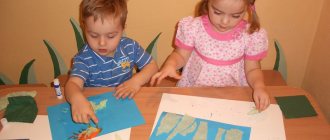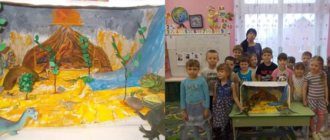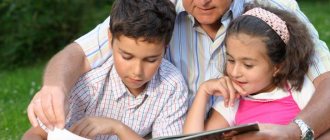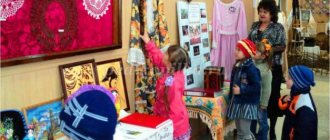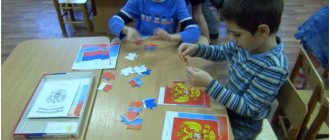“Involving parents in school activities. Joint work to exchange experience"
Author: Fisenko Elena Nikolaevna
From the article by S. V. Astakhov “Current methods and techniques for involving parents in the educational process.”
Astakhov Sergey Vladimirovich
Position held
(positions): head of structural unit
The level of education:
higher
Name of the graduated educational institution: Moscow State Open Pedagogical University named after. M.A. Sholokhov (2002), Moscow Institute of Open Education (2012) Name of area of training and (or) specialty: social educator, educational psychologist; manager
Total work experience
:18
Work experience in specialty:
18
Data on advanced training and (or) professional retraining (if available): - National Research University “Higher School of Economics”, 2014, “Models of state-public management of education in the context of the implementation of Federal Law No. 273-FZ of 29.2012”, 72 hours -NISO, 2013, “Requirements of Federal Law 273-FZ for educational institutions”, 8 hours. - GBOU HPE MSPU, 2013, “Fundamentals of pedagogical and financial management in educational institutions”, 144 hours - Educational, 2013, “Payment in education”, 12 hours - Educational, 2013, “Dismissals of employees” , 12 hours - GBOU "GOMC "School Book", 2012, "Regulatory framework for licensing educational activities", 12 hours - ANOTSPP "Profzaschita", 2013, "Organization and presentation of paid educational services in educational institutions with taking into account the latest changes in legislation", 6 hours - Research Institute of Innovative Technologies, 2012, "Thought-activity pedagogy - experiment and innovation in education", 72 hours - MIOO, 2012, "Fundamentals of religious cultures and secular ethics", 72 part - ANOOPTs "Megapolis", 2012, "NSOT in the educational institution: typical mistakes, problems and ways to solve them", 12 hours - Federal State Budgetary Educational Institution of Higher Professional Education "Russian Chemical-Technological University named after D.I. Mendeleev", 2011, "Information and communication resources of a modern lesson", 72 hours - MIOO, 2011, "Information and educational environment of primary school. Fundamentals of working in the information environment", 228 hours; — MIOO, 2010, “ICT competence of primary school teachers”, 72 hours; — Center for Pedagogical Excellence, 2010, “Methodological foundations of teacher excellence,” 72 hours.
Category:
Higher
Experience:
teacher classes, deputy director of experimental work, methodologist, director, head of structural unit
Awards and honorary titles:
Winner of the competition “The Best Teacher of the Russian Federation” within the framework of the national project “Education” Finalist of the competition “Teacher of the Year in Moscow - 2002, 2004, 2010” Moscow Grant in the field of education Certificate of Honor from the Ministry of Education and Science of the Russian Federation Honorary badge of the North-East Administrative Okrug “Best Teacher” e-mail: [email protected] contact phone: 8-916-9008958 About yourself: Certified for the position of “head” by order of the Moscow Department of Education No. 14/sr dated 05/23/2012, “corresponds to the position of head of the state educational institution for a period until 05/23/2017. »
Printed works:
- articles in the newspaper “Teacher’s Newspaper - Moscow”; — First-Class Parents magazine: No. 3-2012 (“Call to parents: don’t give teachers peace!”); — magazine “Primary School Plus Before and After”: No. 1 - 2010 (“Category “life” in the educational space of primary school”), No. 1 -2011 (“Spirituality in a modern school”); — collections of APKiPRO: 2008 (“Opportunities for parental participation in the development of children’s lives”), 2009 (“Training based on meaningful assessments: results of work”); — project in the teaching aid “Educational Design”; — on the websites: newspapers “First of September”; All-Russian electronic publication ZAVUCH.INFO; Center for Distance Education "EIDOS"; — magazine “Elementary School Management”: No. 10, 11 - 2010, No. 2 - 2011, No. 1 - 2015, No. 3 - 2015.
© Source link:
These methods of working with parents, methods of involving them in the educational process, were developed and tested over four years of experimental work, which was carried out under the leadership of Shalva Aleksandrovich Amonashvili at school No. 258 in Moscow. Sergey Vladimirovich Astakhov – director of school No. 958, Moscow.
Ø One of the conditions for updating the life of a primary school student in the classroom, in our opinion, is the involvement of parents in the educational process, because they are also its participants.
For the development of a child, it is important that parents and school do not compete, but cooperate, only then education will become not an arena of conflict, but a source of joy and tranquility. That is why we consider working with parents as one of the important areas of updating the child’s life in the classroom.
In this case, the teacher sets himself the following tasks:
– psychological and pedagogical education of parents;
– inclusion of parents in the educational process;
– creation of a spiritual community of parents, teachers and children;
– establishment of humane relationships in the family.
It is necessary that parents share the views of the teacher or agree with him in the key moments of raising and educating children.
In this case, the teacher’s efforts receive support from the family, which leads to increased opportunities for updating the child’s life in the classroom, the quality of the educational process, and family upbringing. The main thing is that parents accept the school, take care of it, help it, and that the family establishes humane and personal relationships with the children.
Unfortunately, due to the high pace of life, the lack of organizations and public institutions involved in educating parents, and due to problems of a material nature, adults for the most part have no idea about new methods and forms of education, trends in today's education, its goals and objectives. The teacher can count on the maximum implementation of his ideas only if the student’s family supports him. Therefore, it is necessary to reveal to parents the possibilities of humane pedagogy, to introduce them to various modern technologies, methods, and teaching features.
Ø Existing classifications of methods, in our opinion, do not fully reflect the full range of possibilities for updating a child’s life in the classroom. Traditional methods relate, rather, to the knowledge side of learning, so we followed the path of innovation, which included methods of working with parents ( organizing an open school space),
namely:
– inviting parents to lessons as students (“lessons with parents”);
– inviting parents to lessons as teachers;
– special methods of communication with the family (pedagogical communication within the framework of parent-teacher meetings, opening the educational process for parents, ceremonial parent-teacher meetings);
– inclusion of children and adults in joint creative activities;
– preparation of folders of program material for parents, etc.
Ø Inviting parents to lessons as students.
The teacher prepares a lesson on a subject and gives it to adults. The material corresponds to the age interests of adults, but is presented as it would be presented in a lesson with children. This is done so that parents feel the effect of the techniques, the level of developmental potential of the tasks, a qualitative change in the emotional state, and finally remember themselves as students overcoming learning difficulties. This form of work with parents helps the family understand how and what to teach their children at home.
"Lessons from parents."
When communicating with parents at meetings, the teacher conducts not only fragments of lessons, but also entire lessons in which children are present as guests. Each adult present at such a lesson performs the same tasks as the children. Parents get the opportunity to experience the lesson, the teacher’s techniques and methods, ways of presenting material, and communicating with children; We allow children to hear what their parents say on the issues discussed, how they think.
Another form of parental participation in the educational process, which helps adults feel the significance of their activities, and children experience a sense of pride in them, is inviting parents to lessons as a teacher, as a club leader, to organize events, etc.
. Parents talk about their lives, professions, and teach interesting things. The idea of such lessons, when skillfully organized, should come from the children themselves. The teacher consults with them about work in such lessons and prepares surprises for adults. Students present their works to guests, share their interests, and engage them in discussion of a topic.
The next direction of work is opening the educational process for parents
.
This means that parents are given the opportunity to be present at lessons and activities with their children. Objectives of such a visit:
– show the techniques used by the teacher to satisfy the natural needs of the child;
– show multi-layered tasks
– what children with learning difficulties and children who are ready for a higher level can accomplish;
– show a system of working with children who require special attention (both with learning problems and motivated ones);
– show qualitative changes in the child over a certain period;
– increase the level of motivation to learn.
Let us emphasize: each member of the child’s family can come to any lesson, and the teacher will make this event significant for them, joyful, and memorable. The lesson is held specifically for the guest, the children complete his assignments (which is discussed in advance with the teacher), write essays and reflections and give them to the guest. Parents attend lessons either at their own request or at the invitation of the teacher and children.
The purposes of these invitations can be different: the desire to demonstrate the child’s success, his communication with the teacher, to hear a story about the profession, to share life experience, wisdom (most often grandparents are invited for this).
The teacher, having invited the parents, communicates with them in advance, thinks through the tasks that they will offer the children: you can solve problems, including logical ones, and write reflective essays. Children are also preparing to visit their parents, trying to show off their achievements.
An equally urgent task for the teacher is to include children and adults in joint creative activities.
For example, we ask children to compose little books on various problems with the obligatory involvement of family members in the work: someone prepares the text, someone acts as a proofreader, and someone as an editor. The whole family is looking for information, selecting the most interesting and important information from it. To create their own pages in textbooks, the family helps the child find the necessary material, unusual, cognitively difficult. When performing such tasks, creative collaboration in the family is manifested and, in addition, the child raises the bar of the standard, thereby developing.
The need to create folders of program material for parents
we felt at the end of 2nd grade. Parents see and understand that children go to school with interest and complete assignments, but they cease to understand what children receive from knowledge, i.e. what is the content of the educational program. To answer these questions for parents, we put knowledge of the program material in a special folder. At the same time, it serves the child as a means of observing himself - everyone tracks his own growth in knowledge - and as a tool for setting short-term and long-term goals and objectives, for analyzing the reasons for successes and failures in learning and determining ways to improve them.
Our school had an open day.
Parents of elementary school students showed the greatest activity. While analyzing the event, we found out that the activity of parents at our school is not very high yet. But we are working in this direction. comments powered by HyperComments
How can a school involve parents in the educational process (and why is this necessary?). Experience of teachers from the USA
On Monday, January 18, Russian schoolchildren are returning to class en masse. Teachers are worried: how will everything be after several months of distance learning? Have children become unaccustomed to full-time studies? Will they be able to quickly change the regime? And this is the case when both children and teachers need parental support. Together with teachers from the USA, we are figuring out how to include moms and dads in the educational process.
Useful Mela newsletter twice a week: Tuesday and Friday
SUBSCRIBE
Why should parents get involved in school life?
According to American research by the National Education Association and the National Center for the Prevention of School Expulsion, active parental participation in the educational process affects children's academic performance.
Schoolchildren whose parents support them in their studies improve their attendance and behavior, and develop social skills faster. In addition, it is easier for them to adapt to changes and they are more likely to enroll in a university. In fact, the more parents are involved in school activities, the more successful their child will be.
There are two ways to involve parents in the educational process. Firstly, at the micro level, when the teacher personally communicates with the parents of each student. Secondly, at the macro level, when communication with families is established by a school or educational complex.
How can a teacher involve parents in learning?
Parents are usually busy all the time, constantly working. Sometimes they find it difficult to find time to go to a meeting or take their child to school, let alone actively participate in the life of the class. How, then, to involve them in learning? Heather Wolpert-Gavron, a Los Angeles high school English teacher, offers “8 Ways to Engage Parents in the Classroom” that educators can use both in the classroom and remotely.
- Praise.
Call your parents not only to tell them about the camera being turned off during an online lesson or about unfinished homework. Let them know about your child’s successes, no matter how insignificant they may be. Emphasize the student's strengths and praise him. Parents should see you as an ally, not an adversary. - Atmosphere.
The school should cooperate with parents, not irritate them. It is worth being creative not only in teaching, but also in interacting with families. Talk to parents not only at meetings, but also communicate with them in instant messengers. Try to maintain informal communication and a positive atmosphere. - Individual approach.
Choose a time and method of communication that is convenient for most parents. Some of them may not have a computer, and others may not know how to use email. Remember that every family is different and has different circumstances. - "Piece of pie".
Simplify everything. It is difficult for parents to participate in the educational process. For example, announcements should hang not only at the entrance to the school, but also on the website and in the chat as a pinned message. Communication through several channels requires a lot of effort from both the teacher and the administration, but this way parents will be more actively involved in the life of the school. - Consistency.
Do not give up. Continue sending newsletters, posting video tutorials, calling and praising. Teachers also have little time and a heavy workload, but our persistence will help increase parental activity. - Causes.
Explain your decisions. For example, you follow the principle of restorative justice and when resolving conflicts, you prioritize the well-being of children rather than scolding them. Remember, you may be misunderstood and thought that there is simply no discipline at school. Talk about your goals for changing anything. Project-based learning or a new program? Explain to your parents why and why this happened. - Personality.
Show that you are human too. If students know you as more than just an educator, they will become your allies and help bridge the gap between school and home. - Support.
School should be seen as more than just a place to get grades. It also has clubs and additional lessons, and organizes after-school activities. The school should provide support to parents; it is one of the most important public institutions. The above tips may not be easy to put into practice. But the teacher should not do this alone; he must learn to collaborate with active parents, students and school administration.
How can schools involve parents in their lives?
Not only the teacher, but the entire school or educational complex can take measures to establish communication with parents and involve them in the educational process.
This can be done in several ways. For example, conduct a survey of parents to understand their needs, find out what they need to help their children. At the same time, ask teachers what kind of support they would like to receive from students' families. The school can also broadcast large events or even lessons so parents can learn along with their children.
It is worth making sure that parents know how the school website works, what social networks the school has, and understand where to look for information
For example, the San Gabriel Unified School District, where Heather Wolpert-Gavron works, created the Parents as Partners program. They conducted several webinars for schoolchildren and their families, where experts talked about how to communicate and maintain friendships (including online), resist bullying, and control screen time.
Kindergarten No. 32 “Yolochka”
The Federal State Educational Standard for Preschool Education directs teachers to interact with parents on issues of the child’s education, directly involving them in educational activities for the successful implementation of the basic general education program of the preschool educational institution.
Within the framework of a single educational space, which implies interaction and cooperation between teachers and parents throughout the child’s preschool childhood, we have established.
The goal is to interest parents as much as possible and involve them in active participation in the educational activities of the kindergarten and age group through the organization of various forms of cooperation aimed at interested and close interaction of all participants in educational relations.
In order to effectively interact with parents, an annual work plan is being developed with a set of activities aimed at involving parents in educational activities.
In my activities to interact with the families of students, I use both traditional and active innovative educational forms of cooperation in accordance with the Federal State Educational Standard for Education:
Informational and analytical: collecting a data bank on the families of pupils - aimed at identifying the interests and requests of parents: questionnaires, social surveys, tests, trainings, surveys on any topic.
Visual and informational: the form is used to familiarize yourself with the work of the kindergarten, the life of the group, the features of education and development through a presentation on the official website of the preschool educational institution, groups in Contact on the Internet; parental corners, including: regulatory documents, notices and advertisements, information sheets, instructions for parents, folders - moving.
During the academic year, work concerns issues related to solving the problems of the annual plan of the preschool educational institution for the current academic year. Through surveys of parents, publication of information folders and stands, we try to explain to parents the importance of the issues under consideration in the development of the child. The contents of the travel folders include a section from the experience of family upbringing and child development.
Educational: they provide an opportunity to acquaint parents with the age and psychological characteristics of children through: family clubs, round tables, thematic and individual consultations with preschool education specialists, open classes with children, pedagogical conversations, master classes, parent meetings using photo reports, multimedia, video presentations about life of children in the group; a children's library for children and parents has been created on the basis of a preschool educational institution - “My Fairy-tale World”, where a collection of not only children’s fiction is collected, but also a collection of pedagogical and psychological literature popular for parents, magazines “For you parents”, which parents can take home for a certain time.
Parents are involved in the preparation of parent-teacher meetings in order to develop parental interest and initiative; at meetings, parents share their experiences in family education.
“Parent is a guest of the group”: allows you to most fully reveal the content of the teacher’s activities, clearly show effective forms, methods and techniques of working with children - parents are involved in organizing and conducting educational activities, routine moments; participate in the “Week of getting to know the profession of parents”, where they talk about their profession, use modern methods, information and communication technologies; read books to children, “We have fun playing together” - organize games, etc.
Visiting a kindergarten during the “Open Day”: at this time, parents have a unique opportunity to “live” the whole day in a preschool institution with their child - watch and take part in the morning warm-up, attend classes, go for a walk, and have a meal , doing gymnastics after a nap, etc.
Participation of parents in children's research and project activities: by participating in the implementation of the project, parents are not only sources of information, real help and support for the child and teacher in the process of working on the project, but also become direct participants in the educational process, enrich their teaching experience, and experience a sense of ownership and satisfaction from your successes and the achievements of your child. The defense of family projects (the result of work on the project) is of a creative nature: a message with visual information, a presentation, an exhibition, a photo report, etc.
Joint creative activities with children: thematic exhibitions, competitions, tasks organized as part of the implementation of projects in educational areas of the main general education program of the preschool educational institution: exhibitions, competitions and tasks allow parents and children to organize joint creative activities at home (draw a picture, make a craft, make a model, design a photo collage , photo exhibition, compose a fairy tale, prepare a costume, etc.); participation of parents together with children in competitions at different levels - republican, municipal, and within preschool educational institutions. In the process of joint preparation of materials, adults and children get to know each other even better; the family has another opportunity to talk about the child, about his life in the group and at home. Therefore, joint creativity is another way to build relationships between educators, parents and children.
Leisure: thematic and creative - used to establish emotional contact between teachers, parents and children: joint preparation of children's parties, leisure activities, themed days, quizzes, literary evenings and the participation of parents in them; participation in creative workshops of preschool educational institutions; “Hour of Family Hobbies” - parents conduct master classes on learning how to master their needlework, mastering non-traditional drawing techniques, teaching hair braiding, etc.; “Visiting a fairy tale” - involving parents in organizing theatrical productions.
Help in replenishing the developmental subject-spatial environment of the group, the walking area: the “Gifts for the Group” campaigns (toys, books, magazines, games that are no longer needed at home, but may well be useful when organizing educational activities in the preschool) have become traditional in the preschool educational institution; production of didactic materials, manuals for classes and free play activities of children.
Work in the Parent Committee of the group: in the group, the Parent Committee is created from among interested parents and provides assistance to educators: creating conditions for educational activities in the group, organizing tea parties, participating in labor landings, cleanup days “Day of Good Deeds”, “Creative Weekend” for landscaping the site and group premises, organization of children's events outside the preschool educational institution: organization of excursions, visits to theaters, museums, libraries, sports facilities.
The introduction of innovative forms of interaction between preschool educational institutions and families of pupils is facilitated by:
- Positive emotional attitude of teachers and parents to work together to raise children, uniting participants in educational relations.
- Taking into account the child’s individuality, because The teacher, constantly maintaining contact with the family, knows the characteristics and habits of his pupil and takes them into account when working, which, in turn, leads to increased efficiency of the pedagogical process.
- Independent choice of parents of forms and directions in the development and upbringing of the child, which they consider necessary. In this way, parents begin to understand the responsibility they bear for raising their children.
- Strengthening intra-family ties.
- Possibilities of implementing a unified program for the upbringing and development of children in preschool educational institutions and families.
